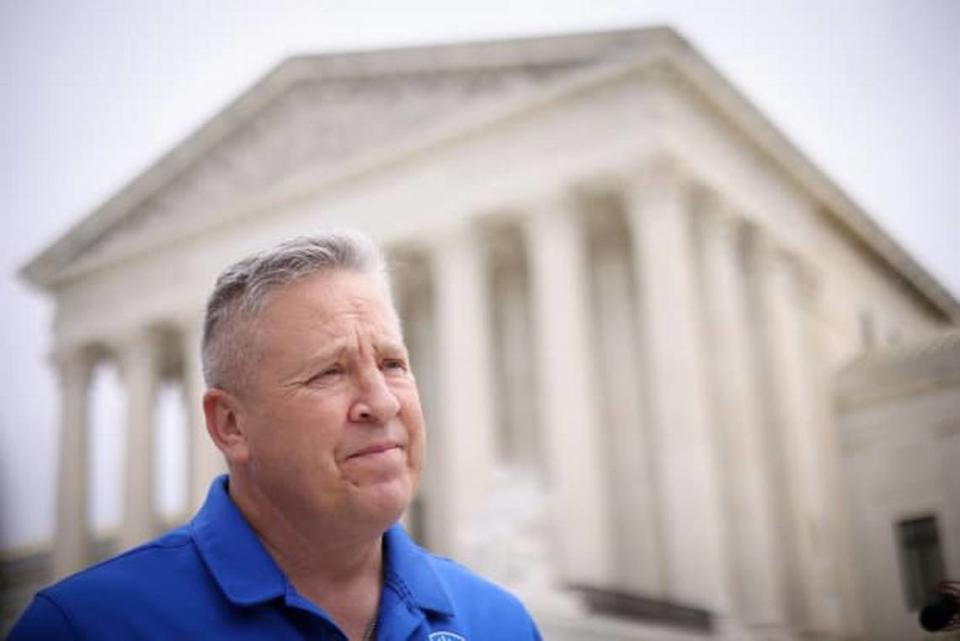Football coach wins Supreme Court prayer case, and that’s good for all of our speech rights
The words of our First Amendment may not echo in the minds of most people in their everyday lives, but its protections do. Whether you disagree with a politician on NextDoor, rant against your local school board on Facebook, or tell your child’s public school teacher you’re praying for her, these are all kinds of speech the First Amendment protects.
While the Founders wanted people to feel free to practice any religion (or none) and pretty much say whatever they wanted without fear of state-sanctioned repercussions, they also didn’t want a state-established religion. While boundaries for the former are easy to spot, the latter is not, and often government employees, like schools, get caught up in disputes.
Such is the case with Joe Kennedy, a football coach at the Bremerton School District in Washington state until the school fired him for praying quietly, but regularly, on the 50-yard line alongside his high school players. School officials said they didn’t want to be held liable for supporting religion on government property. Kennedy sued the district for violating his constitutional rights. The case went to the Supreme Court and on Monday, Kennedy won.
Because the case involves such unique factors —a public school employee offering religious expressions on government property to any kids who wanted to voluntarily participate — the ruling will be an important precedent.

Before it reached the Supreme Court, the 9th U.S. Circuit Court of Appeals found it was well within the Bremerton School District’s right to fire Kennedy. The court said that because he was a government employee, his speech — including his prayers — violated the First Amendment’s prohibition on the government’s sponsorship or “establishment” of religion.
Thankfully, in his majority opinion, Justice Neil Gorsuch said Kennedy’ brief prayers were not “government speech” but “private speech” and thus protected under the First Amendment. The justices’ conclusion that a coach uttering a brief prayer on a school football field is not the same as a state entity, like a public school, establishing religion should be a relief to anyone of any religious faith or none at all. As a friend tweeted, the fact that the three dissenting judges thought a 30-second prayer constituted the establishment of a state-sponsored church is outrageous.
The ruling should be positive to both atheists and devout believers alike because it explains how we can protect religious freedom and the autonomy of the state.
“Learning how to tolerate speech or prayer of all kinds is part of learning how to live in a pluralistic society, a trait of character essential to a tolerant citizenry,” Gorsuch wrote. “Respect for religious expressions is indispensable to life in a free and diverse Republic—whether those expressions take place in a sanctuary or on a field, and whether they manifest through the spoken word or a bowed head.”
In dissent, Justice Sonia Sotomayor called the decision “particularly misguided because it elevates the religious rights of a school official, who voluntarily accepted public employment and the limits that public employment entails, over those of his students ... who are required to attend school and who this court has long recognized are particularly vulnerable and deserving of protection.”
Sotomayor attempts to pinpoint the heart of this debate, but her comments are slightly misguided. She attempts to essentially ask: If you’re a government employee, where do your rights end and the government’s begin? But the court’s decision that Kennedy cannot be fired because he prayed on school grounds with kids doesn’t elevate his rights, it recognizes them.
For people who are concerned the Supreme Court is encouraging government employers to sanction religion, this decision in no way does that. It simply reinforces the fact that the First Amendment protects government employees who want to express their faith in a private capacity.
It’s a boon to believers and the state alike, because it neither goes too far nor falls short of everyday First Amendment protections for important parts of regular life.

 Yahoo Movies
Yahoo Movies 
